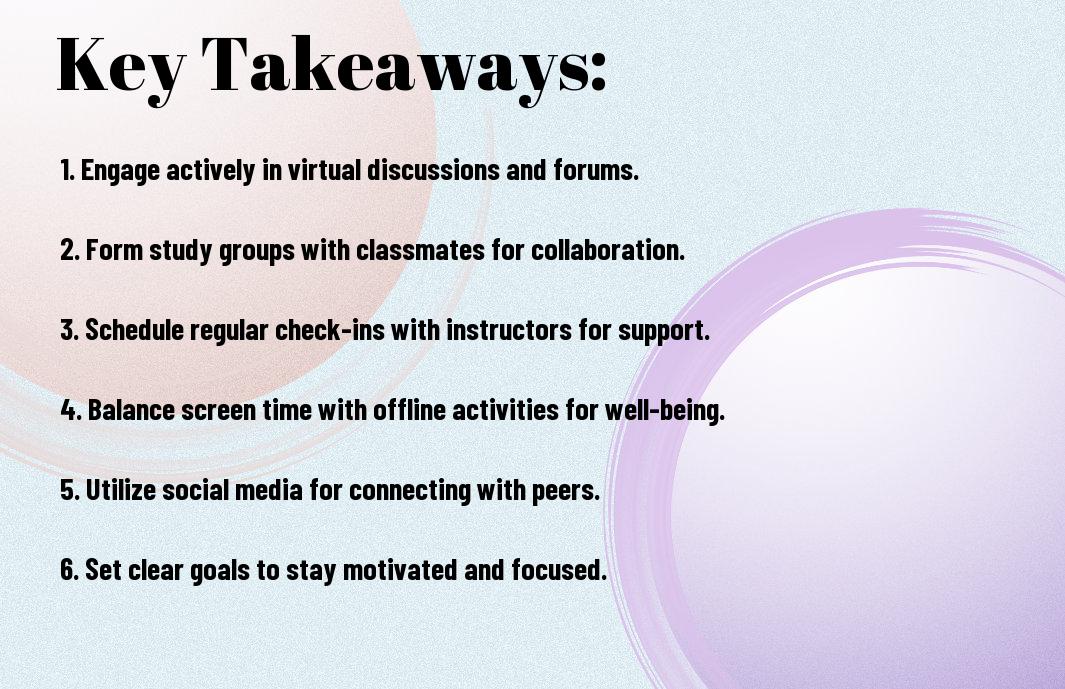To tackle the challenges of online learning, consider the following points:
- Establish a routine to provide structure and help you stay on track with your studies.
- Utilize technology to connect with peers and instructors through video conferencing tools, discussion forums, and social media groups.
- Seek out support from family, friends, or a mentor to help you stay motivated and address any concerns you may have.
- Take breaks and prioritize self-care to avoid burnout and maintain a healthy work-life balance.
- Set goals and track progress to help you stay focused and achieve academic success in an online learning environment.
Setting Up a Supportive Environment
For a successful online learning experience, you need to set up a supportive environment that fosters productivity and motivation. This involves creating a dedicated space for learning, free from distractions and interruptions.
Creating a dedicated learning space
Before you begin, designate a specific area for learning, and make it your own by adding personal touches that inspire you, such as favorite books or quotes.
Minimizing distractions and staying focused
Distractions are inevitable, but you can minimize them by turning off notifications, logging out of social media, and using website blockers to stay on track.
A key part of staying focused is establishing a routine and setting clear goals for each study session, allowing you to stay motivated and engaged, and helping you to make the most of your online learning experience, as you navigate the vast expanse of digital knowledge, crafting your own path to success.


Staying Connected with Peers and Instructors
The online learning environment can often feel isolating, but it doesn’t have to be. You can combat this by reading about Combatting online learning’s loneliness epidemic and taking steps to stay connected with your peers and instructors.
Joining online communities and forums
Besides the structured learning environment, you can also engage with others through online communities and forums, where you can discuss topics related to your course and get support from your peers.
Participating in virtual discussions and meetings
For a more interactive experience, you can participate in virtual discussions and meetings, which allow you to engage with your instructors and peers in real-time, facilitating a sense of connection and community.
Joining these virtual discussions and meetings can help you feel more connected to your learning community, and you can take an active role by sharing your thoughts, asking questions, and engaging with others, allowing you to build relationships and collaborate with your peers, making your online learning experience more enjoyable and enriching.
Building a Routine and Staying Motivated
Many online learners struggle to stay motivated, but establishing a routine can help. You can start by setting achievable goals and tracking your progress, which will help you stay focused and motivated throughout your learning journey.
Creating a schedule and sticking to it
Establishing a schedule is key to staying on track. You can begin by allocating specific times for learning, breaks, and leisure activities, and then stick to your plan as much as possible, allowing for some flexibility when needed.
Rewarding yourself for milestones achieved
By acknowledging and celebrating your accomplishments, you can reinforce positive behaviors and stay motivated. You can treat yourself to something special when you reach a milestone, such as completing a difficult course or finishing a project.
Hence, rewarding yourself for milestones achieved is an effective way to boost your motivation and engagement in online learning. You can choose rewards that are meaningful to you, such as taking a break to read a book, watching a movie, or going for a walk, and make sure to celebrate your progress along the way, no matter how small it may seem, to keep yourself motivated and inspired to continue learning.
Overcoming Technical Challenges
Now that you’ve commenceed on your online learning journey, you’ll inevitably encounter technical hurdles that can leave you feeling frustrated and disconnected. But fear not, for these challenges can be overcome with the right mindset and strategies.
Troubleshooting common technical issues
Around the time you encounter a technical glitch, take a deep breath and try to identify the source of the problem, whether it’s a faulty internet connection or a software compatibility issue, and attempt to resolve it using your intuition and troubleshooting skills.
Seeking help from technical support teams
Unlike other challenges you may face, technical issues can often be resolved with the help of a dedicated support team, so don’t hesitate to reach out to them when you need assistance, and they will guide you through the process of resolving the issue.
The technical support team is there to help you navigate the complexities of online learning, and by seeking their help, you can get back on track with your studies, and they will provide you with the necessary tools and guidance to overcome any technical obstacles that may arise, allowing you to focus on what matters most – your learning and growth.
Prioritizing Self-Care and Wellbeing
All online learners face unique challenges, and taking care of your physical and mental health is crucial to success. You must make time for activities that bring you joy and help you relax.
Taking breaks and practicing self-care
Thereby, establishing a routine that includes self-care activities will help you stay focused and motivated. You can try meditation, reading, or spending time with loved ones to reduce stress and increase productivity.
Staying physically and mentally active
Physically, you need to get moving to stay healthy and energized. You can try simple exercises like stretching or yoga to get started, and find activities that you enjoy to make it a habit.
Taking care of your physical health will have a significant impact on your mental wellbeing. You will feel more confident, focused, and prepared to tackle challenges as you engage in regular physical activity, and your mind will be sharper and more receptive to new ideas and knowledge, helping you to stay engaged and motivated in your online learning journey.
Seeking Help and Resources
Despite the flexibility of online learning, you may still feel isolated, but there are ways to overcome this. You can seek help and resources to stay connected and engaged, such as online forums, tutorials, and support groups, to help you navigate your course and connect with others.
Accessing online resources and tutorials
Seeking out online resources and tutorials can be a great way to supplement your learning and connect with others who share your interests. You can find a wealth of information online, from video lectures to interactive simulations, to help you deepen your understanding of the material.
Reaching out to instructors and peers for support
Accessing support from your instructors and peers can be a powerful way to combat isolation. You can reach out to them via email, discussion forums, or video conferencing, to ask questions, share your thoughts, and get feedback on your work, helping you feel more connected and supported.
In addition, when you reach out to your instructors and peers, you open yourself up to a wealth of knowledge, experience, and perspectives, which can help you stay motivated and inspired. You can participate in online discussions, join study groups, or collaborate on projects, allowing you to build relationships and a sense of community, even in a virtual environment, and helping you to overcome the feeling of isolation and stay engaged in your learning journey.
To wrap up
Presently, you’ve gathered the tools to break free from the shackles of isolation in online learning. You’ve learned to weave a web of connections, to nurture your curiosity, and to transform your learning space into a realm of wonder. As you initiate on this journey, your path will be illuminated by the thrill of discovery, and the boundaries of isolation will fade away, allowing you to tap into the limitless potential of online learning, and unlock the secrets that await your curious mind.
FAQ
Q: What are the main challenges of online learning that can lead to isolation, and how can I identify if I’m experiencing them?
A: Online learning can sometimes lead to feelings of isolation due to the lack of face-to-face interaction with peers and instructors. The main challenges include difficulty in staying motivated, lack of immediate feedback, and technical issues. To identify if you’re experiencing these challenges, pay attention to your engagement level in your courses, your ability to manage your time effectively, and your overall satisfaction with your learning experience. If you find yourself struggling to stay motivated, feeling disconnected from your learning community, or facing recurring technical difficulties, it may be a sign that you’re experiencing isolation in your online learning environment.
Q: How can I maintain social connections and a sense of community while learning online to overcome feelings of isolation?
A: Maintaining social connections is key to overcoming isolation in online learning. You can achieve this by actively participating in online forums and discussion groups, attending virtual events and webinars, and using social media platforms to connect with your peers and instructors. Additionally, consider joining online clubs or study groups related to your course of study. These interactions can help you build relationships, share experiences, and feel more connected to your learning community. Regular communication with your instructors can also provide support and help you stay engaged with your coursework.
Q: What strategies can I implement to stay motivated and engaged in my online courses, thereby reducing the likelihood of feeling isolated?
A: To stay motivated and engaged in your online courses, set clear goals and deadlines for yourself, and create a dedicated and distraction-free study space. Establishing a routine and sticking to it can help you stay on track. It’s also beneficial to use a variety of learning materials, such as videos, podcasts, and interactive quizzes, to keep your learning experience interesting and engaging. Furthermore, celebrating your achievements and seeking help when needed can boost your motivation. Connecting with family and friends about your learning progress and involving them in your goals can provide an additional layer of support and accountability, helping to mitigate feelings of isolation.
